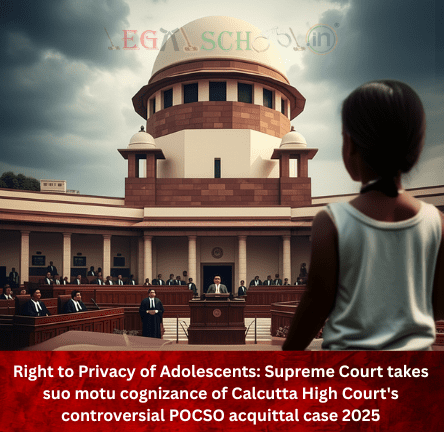Roadmap
ToggleRight to Privacy of Adolescents POCSO acquittal case 2025
Case Background
In May 2018, a 14-year-old West Bengal girl went missing, later found to have married a 25-year-old man with his sisters’ help. Her mother filed a kidnapping FIR. In September 2022, the Baruipur District Court convicted the man under IPC Sections 363, 366, 376(3), 376(2)(n), and Section 6 of the POCSO Act, sentencing him to 20 years.
However, in July 2023, the Calcutta High Court acquitted him. The girl, now a destitute single mother to their child, testified she eloped and married voluntarily. The High Court invoked CrPC Section 482, suggesting POCSO Act amendments for consensual relationships. The case originated with the girl eloping on May 20, 2018, allegedly enticed by the accused. Her mother filed the FIR on May 29, 2018, to secure her return, but she did not come back. The accused is the child’s biological father.
Legal Issue
The central legal issue was whether consensual sexual relationships involving minors could be exempted from the stringent provisions of the POCSO Act. The Calcutta High Court’s observations, particularly advising adolescent girls to “control sexual urges,” raised concerns about victim-blaming and the appropriateness of such remarks in judicial decisions.
Core Legal Questions Before the Supreme Court
- Interpretation of POCSO Act: A central question was whether consensual relationships involving minors could be exempt from statutory definitions of aggravated sexual offenses under the POCSO Act, and if the concept of “non-exploitative consensual acts” had any legal validity in this context. This directly challenged the Calcutta High Court’s attempt to introduce such distinctions.
- Scope of Judicial Discretion: The Court deliberated on the extent to which High Courts could exercise jurisdiction under Section 482 of the Code of Criminal Procedure (CrPC) or Article 226 of the Constitution to quash convictions in serious offenses like rape under POCSO, especially when a “settlement” was reached between the accused and the victim (now an adult).
- Application of Article 142: A critical inquiry revolved around the scope and limits of the Supreme Court’s extraordinary powers under Article 142 of the Constitution to “do complete justice,” particularly in mitigating punishment against statutory minimums, and balancing punitive measures with restorative justice and victim welfare.
- State’s Obligation for Victim Rehabilitation: The Court also focused on the State’s constitutional duty under Article 21 to provide care, protection, and rehabilitation to minor victims of sexual offenses, and the mandatory implementation of provisions like Section 19(6) of the POCSO Act and the Juvenile Justice (Care and Protection of Children) Act, 2015.
Supreme Court’s Judgment
On August 20, 2024, the Supreme Court, in a suo motu writ petition titled In Re: Right to Privacy of Adolescents, set aside the Calcutta High Court’s judgment. A bench comprising Justices Abhay S. Oka and Ujjal Bhuyan restored the conviction of the accused under the POCSO Act and IPC. The Court criticized the High Court’s “objectionable” and “sweeping” observations, stating that judges should decide cases based on law and facts, not personal views or moral preaching.

